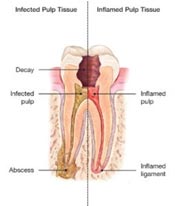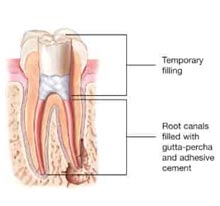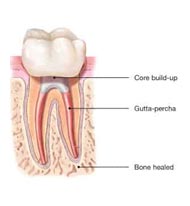Root Canal Therapy
A root canal is a procedure that is undertaken to save your natural tooth. It is often performed to treat either pain or an infection associated with one or more of your teeth. Having a root canal performed feels a lot like having a filling placed. Local anesthesia is used to adequately numb the tooth, and aside from slight pressure you will have no pain or discomfort during treatment.
Every tooth has one or more canals running throughout the tooth and the tooth root. These canals are filled with a tissue called the dental pulp, which helped to form and grow the tooth when you were a child. When these tissues become inflamed or infected, root canal therapy is indicated. This can be brought about by a deep cavity, a fracture in the tooth, extensive dental treatment, trauma to a tooth, severe periodontal or gum disease, or a number of other conditions.
During a root canal treatment, the tooth is adequately numbed. A protective rubber sheet is applied to the tooth to keep the working field as clean as possible. Under a powerful microscope, a small hole is typically made through the chewing surface of the tooth for back teeth, or from the tongue-side of the tooth in a front tooth. Through this small hole the dental pulp is removed, the canal system is thoroughly cleaned and disinfected, and then is filled with a mixture of biocompatible cement and a material called gutta percha (which is similar to rubber). The small hole will then be sealed with either a permanent or temporary filling, based on the recommendation from your dentist.
Unless you have requested oral sedation, you will be able to drive yourself to and from your appointment and will be able to return to work or school if desired. Most people are able to return to normal exercise and function within a day or two of treatment.





